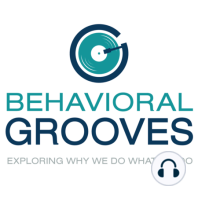58 min listen

Eugen Dimant, PhD: What To Do About Bad Apples
Eugen Dimant, PhD: What To Do About Bad Apples
ratings:
Length:
56 minutes
Released:
Aug 30, 2020
Format:
Podcast episode
Description
[NOTE: Republished in its entirety from original episode #104 on December 15, 2019.]
Eugen Dimant, PhD is a Postdoctoral Researcher in the Master of Behavioral and Decision Sciences Department and a Senior Research Fellow at the Identity and Conflict Lab, Political Science Department – both at the University of Pennsylvania.
His research is rooted in economics and sits at the crossroads of experimental behavioral economics, behavioral ethics, crime, and corruption, with much of his recent work focusing on the ways “bad apples” (people will malintent) can be thwarted. This is also manifest in his research on behavioral contagion of pro- and anti-social behavior among individuals and groups. Because we met up with him presenting a paper at NoBeC, a social norms conference, we also discussed the role of social norms in pro- and anti-social behaviors.
We are inspired by Eugen’s work with social nudges and what can be done to minimize the impact of people who are out to corrupt systems and communities. And, we had a great time talking with this incredibly passionate researcher about his wide variety of interests.
We are grateful to Eugen for reaching out to us as we were planning our 100th Episode celebration in Philadelphia. He invited us to the University of Pennsylvania’s NoBeC Conference – the Norms and Behavioral Change Conference – that was happening the same days that we were recording our 100th Episode. Eugen, along with his colleague Chris Nave, PhD, helped us arrange conversations with many researchers and speakers at the conference and we are forever grateful.
Finally, we invite you to keep listening after our discussion with Eugen to hear Kurt and Tim’s Grooving Session and then the Bonus Track where we recap the key insights from the episode.
© 2020 Behavioral Grooves
LINKS:
Eugen Dimant, PhD: https://www.sas.upenn.edu/lps/graduate/mbds/faculty/eugen-dimant
NoBeC (Norms and Behavior Change Conference): https://web.sas.upenn.edu/nobec/
Cristina Bicchieri, PhD: https://upenn.academia.edu/CristinaBicchieri
Gary Bolton, PhD: https://personal.utdallas.edu/~gxb122130/
Nudge: https://en.wikipedia.org/wiki/Nudge_theory
Social Norms: https://plato.stanford.edu/entries/social-norms/
Injunctive and Descriptive Norms: https://study.com/academy/lesson/injunctive-and-descriptive-group-norms-definitions-differences-examples.html
Pluralistic Ignorance: https://en.wikipedia.org/wiki/Pluralistic_ignorance
Peer Effects: https://www.encyclopedia.com/social-sciences/applied-and-social-sciences-magazines/peer-effects
Coleman’s Boat: https://www.youtube.com/watch?v=dGaz0xKG060
Chris Nave, PhD: https://www.sas.upenn.edu/lps/graduate/mbds/contact/christopher-nave
Bobo Doll Effect: https://en.wikipedia.org/wiki/Bobo_doll_experiment
Robert Cialdini, PhD: https://en.wikipedia.org/wiki/Robert_Cialdini
Kiki and Bouba: https://en.wikipedia.org/wiki/Bouba/kiki_effect
Pollstar: https://www.pollstar.com/
Musical Links
Drake: https://en.wikipedia.org/wiki/Drake_(musician)
Bushido: https://en.wikipedia.org/wiki/Bushido_(rapper)
U2: https://en.wikipedia.org/wiki/U2
Ed Sheeran: https://en.wikipedia.org/wiki/Ed_Sheeran
Eagles: https://en.wikipedia.org/wiki/Eagles_(band)
Rolling Stones: https://en.wikipedia.org/wiki/The_Rolling_Stones
Fleetwood Mac: https://en.wikipedia.org/wiki/Fleetwood_Mac
Eugen Dimant, PhD is a Postdoctoral Researcher in the Master of Behavioral and Decision Sciences Department and a Senior Research Fellow at the Identity and Conflict Lab, Political Science Department – both at the University of Pennsylvania.
His research is rooted in economics and sits at the crossroads of experimental behavioral economics, behavioral ethics, crime, and corruption, with much of his recent work focusing on the ways “bad apples” (people will malintent) can be thwarted. This is also manifest in his research on behavioral contagion of pro- and anti-social behavior among individuals and groups. Because we met up with him presenting a paper at NoBeC, a social norms conference, we also discussed the role of social norms in pro- and anti-social behaviors.
We are inspired by Eugen’s work with social nudges and what can be done to minimize the impact of people who are out to corrupt systems and communities. And, we had a great time talking with this incredibly passionate researcher about his wide variety of interests.
We are grateful to Eugen for reaching out to us as we were planning our 100th Episode celebration in Philadelphia. He invited us to the University of Pennsylvania’s NoBeC Conference – the Norms and Behavioral Change Conference – that was happening the same days that we were recording our 100th Episode. Eugen, along with his colleague Chris Nave, PhD, helped us arrange conversations with many researchers and speakers at the conference and we are forever grateful.
Finally, we invite you to keep listening after our discussion with Eugen to hear Kurt and Tim’s Grooving Session and then the Bonus Track where we recap the key insights from the episode.
© 2020 Behavioral Grooves
LINKS:
Eugen Dimant, PhD: https://www.sas.upenn.edu/lps/graduate/mbds/faculty/eugen-dimant
NoBeC (Norms and Behavior Change Conference): https://web.sas.upenn.edu/nobec/
Cristina Bicchieri, PhD: https://upenn.academia.edu/CristinaBicchieri
Gary Bolton, PhD: https://personal.utdallas.edu/~gxb122130/
Nudge: https://en.wikipedia.org/wiki/Nudge_theory
Social Norms: https://plato.stanford.edu/entries/social-norms/
Injunctive and Descriptive Norms: https://study.com/academy/lesson/injunctive-and-descriptive-group-norms-definitions-differences-examples.html
Pluralistic Ignorance: https://en.wikipedia.org/wiki/Pluralistic_ignorance
Peer Effects: https://www.encyclopedia.com/social-sciences/applied-and-social-sciences-magazines/peer-effects
Coleman’s Boat: https://www.youtube.com/watch?v=dGaz0xKG060
Chris Nave, PhD: https://www.sas.upenn.edu/lps/graduate/mbds/contact/christopher-nave
Bobo Doll Effect: https://en.wikipedia.org/wiki/Bobo_doll_experiment
Robert Cialdini, PhD: https://en.wikipedia.org/wiki/Robert_Cialdini
Kiki and Bouba: https://en.wikipedia.org/wiki/Bouba/kiki_effect
Pollstar: https://www.pollstar.com/
Musical Links
Drake: https://en.wikipedia.org/wiki/Drake_(musician)
Bushido: https://en.wikipedia.org/wiki/Bushido_(rapper)
U2: https://en.wikipedia.org/wiki/U2
Ed Sheeran: https://en.wikipedia.org/wiki/Ed_Sheeran
Eagles: https://en.wikipedia.org/wiki/Eagles_(band)
Rolling Stones: https://en.wikipedia.org/wiki/The_Rolling_Stones
Fleetwood Mac: https://en.wikipedia.org/wiki/Fleetwood_Mac
Released:
Aug 30, 2020
Format:
Podcast episode
Titles in the series (100)
Behavioral Grooves 2: Chad Emerson, President of The 421: Chad Emerson founded The 421 to help people with addictions make better decisions. He focuses his comments on being "change ready" and the importance of preparing oneself for making a change in life. Chad's website www.the421.com includes more informatio... by Behavioral Grooves Podcast